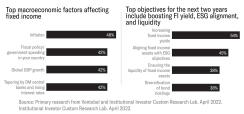Disruption on the path to post-pandemic normalcy leads institutional investors beyond their usual fixed income universe, as they seek diversification, higher yields, and assets aligned with ESG mandates. Recent research from Vontobel and Institutional Investor’s Custom Research Lab reveals that investors see global economic crises as both a threat to current fixed income strategies and a potential source of relief from a languishing bond market.
After two years spent mired in the Covid-19 pandemic, economies across the world have endured devastating events that may well be unique in modern history. Sustained economic shutdowns and powerful stimulus from national governments have disrupted equity markets, pushing them to new heights, followed by punishing corrections in the first half of 2022. Economic stimulus programs for companies and households – coupled with pent-up demand and supply chain problems – have driven inflation to 40-year highs in many developed markets. In response, national governments around the world now adopt hawkish monetary policies in an effort to tame inflation – without harming near-term economic growth and labor force participation.
Russia’s invasion of Ukraine in February 2022 has made a bad economic situation worse. Suspension of long-standing purchases of energy, grain, and other basic inputs from Russia has contributed to inflation and disrupted commodity markets amid an increasingly integrated supply chain and global economy.
The invasion has hit fixed income markets in emerging Europe and elsewhere hard, as investors retreat from the conflict and uncertainty in the region. In due course, shifts in monetary policy and the volatility of asset markets are likely to spur investors to revisit their allocations to fixed income in both developed and emerging markets. Indeed, they’re likely to reveal opportunities for new bond investors to earn higher cash yields and encourage those who currently hold bonds to retain them in the hope of price recovery in the future.
Queried in Q1 of 2022, institutional investors say they’re most eager to increase the yield on their fixed income allocations while ensuring their holdings are highly liquid, compliant with ESG mandates, and provide diversification versus their other holdings. These aspirations come amid investors’ anxiety about the impact of inflation, government spending and monetary policy, and trade/geopolitical matters on fixed income markets, as shown below.

“The biggest thing affecting fixed income right now is inflation worldwide,” says the head of a Swiss pension, “especially in the US and Europe now, with energy prices as they are. Similarly, a portfolio manager at a large German insurer says, “Inflation will be the most important macroeconomic driver in fixed income over the next few years. We are in the camp that thinks inflation will be higher for longer, although not at current levels. Because of the super-cycle of high demand for commodities, this inflation may be here to stay for some years. Inflation will be higher now with the war in Ukraine, too, and it is the big issue hurting emerging market debt.”
This quest for stable, highly liquid fixed income yield is commonplace among institutional investors. A fixed income analyst at a UK insurer says, “Our book of assets is primarily investment grade fixed income with short duration, primarily in developed markets. It doesn’t pay very much, but it pays something; it’s very liquid, and it’s generally low risk – so when there’s a catastrophe and we have to pay claims, having most of our money in very safe assets is very valuable to us.” He and his team look for higher returns on the firm’s surplus through emerging market fixed income: “Because EM debt is less liquid than US investment grade bonds, we see it as a surplus rather than reserve asset,” says the UK fixed income analyst. “We don’t want to have to sell them regularly to fund claims. We want to be able to hold them through volatile periods, collect the income, and ride out the mark-to-market volatility.”
The war in Ukraine is undoubtedly disruptive to the economies of developed and emerging Europe, but, say sources, amid this disruption lies both risk and opportunity. “With what we see now from Russia and Ukraine – we don’t really foresee a worldwide recession,” says the Swiss pension head. “I’m quite optimistic because we’ve had this correction caused by Russia and Ukraine. And I think it’s a good time now to start thinking about a greater allocation to emerging market bonds so we can profit from the recovery that we expect.”
Echoing the crisis-presents-opportunity views of his peers, he sees sound investment prospects in the wake of the war in Europe. “Obviously at the moment the whole sector of EM fixed income is getting hurt because of the contagion that’s coming via Russia and Ukraine.” This contagion spreads throughout the EM fixed income sector because, he says, some investors seek to sell the Russian or Ukrainian debt instruments in their EM portfolios but cannot. In response, some sell other EM bonds from their portfolios, thus increasing the supply on the market and driving down prices – in effect, the market becomes oversold. “When people just want to get their money out and exit,” says the fixed income manager in Australia, “they just exit with what they can sell, and this creates opportunities for an active manager to say, ‘company X or country Y has moved further than what the fundamentals say it should, and that’s a great opportunity.’”
This article is adapted from the research report, Institutions Look to Emerging Market Fixed Income for Yield, Diversification, and ESG Alignment, published by Vontobel Asset Management and II’s Custom Research Lab in May 2022. The study includes survey data from more than 300 asset-owning institutions worldwide and interviews with ten investment decision makers at such institutions. Click here to download the full report www.vontobel.com/fi2022.
More From Vontobel:
New Markets, New Opportunities, and New Risks for EM Fixed Income Investors
ESG Mandates Influence Decision Making Among Emerging Market Fixed Income Investors
In Emerging Markets, Active Fixed Income Investors Look for “Speedboats, Not Oil Tankers”






